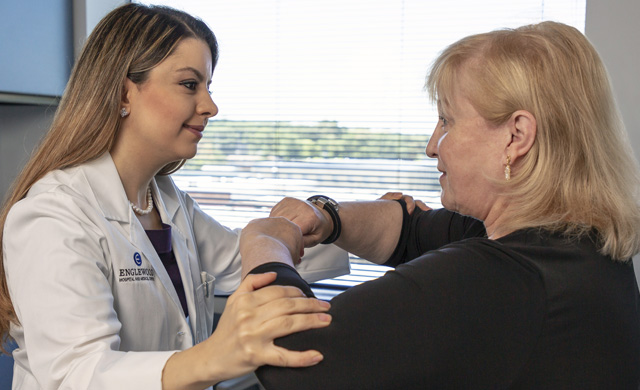
Our expert neurologists will thoroughly assess your symptoms and perform diagnostic testing so that we can determine an accurate diagnosis. We’ll answer your questions and work closely with you to establish a plan for treatment and follow-up.
EMG (Electromyogram) and Nerve Conduction Studies
We use an EMG (electromyogram) to measure the electrical activity of your muscles at rest and during contraction. We use nerve conduction studies to assess how well and how fast your nerves can send electrical signals.
We often do both of these noninvasive tests at the same time to determine whether you have a muscular or nerve problem. We can use them to assess symptoms including numbness, tingling, and weakness; we may also use them to diagnose carpal tunnel syndrome, peripheral neuropathy, or radiculopathy (pinched nerves in your spine).
EEG (Electroencephalogram)
We use an EEG (electroencephalogram) to record brain wave patterns. During this noninvasive procedure, one of our technicians will place electrodes on your scalp. These electrodes detect tiny electrical charges caused by your brain cells.
The test can reveal problems related to your brain activity and help us diagnose seizures, epilepsy, head injuries, dizziness, headaches, brain tumors, and sleeping problems.
Bergen Neurology Consultants offers routine EEGs, outpatient ambulatory EEG video monitoring, and inpatient EEG monitoring.
Sleep Studies
 We may recommend a sleep study to help us assess and diagnose sleep disorders, such as sleep apnea, narcolepsy, restless legs syndrome, and insomnia. We also use sleep studies to evaluate sleep-related behaviors like sleepwalking and REM sleep behavior disorder, as well as sleep-related seizure disorders. We offer inpatient and home sleep testing.
We may recommend a sleep study to help us assess and diagnose sleep disorders, such as sleep apnea, narcolepsy, restless legs syndrome, and insomnia. We also use sleep studies to evaluate sleep-related behaviors like sleepwalking and REM sleep behavior disorder, as well as sleep-related seizure disorders. We offer inpatient and home sleep testing.
NeuroTrax Cognitive Testing
NeuroTrax is a computerized assessment of your brain’s overall fitness. We use it to test your core cognitive functions — memory, executive function, attention, visual spatial function, verbal function, problem-solving, and working memory.
We use it to assess individuals who have experienced a head trauma to determine if they’ve suffered any neurological impairment, and we also use it to diagnose attention deficit disorders and dementia.
The test typically takes 30 to 45 minutes and is available in several languages.
Neuropsychological Testing
If you’ve experienced brain damage, brain disease, or severe mental illness, we may recommend neuropsychological testing. It helps us assess your cognitive, motor, behavioral, linguistic, and executive functioning.
Typically given as a series of tests, this kind of evaluation can assist us in diagnosing attention deficit disorder, confirming a diagnosis of anxiety or depression, and differentiating types of dementia.
Carotid Artery Ultrasound
Carotid ultrasound uses sound waves to create pictures of your carotid arteries, which carry blood from the heart to the brain.
We use it to evaluate whether a neurological symptom is caused by poor blood flow, a stroke, or transient ischemic attack (TIA).